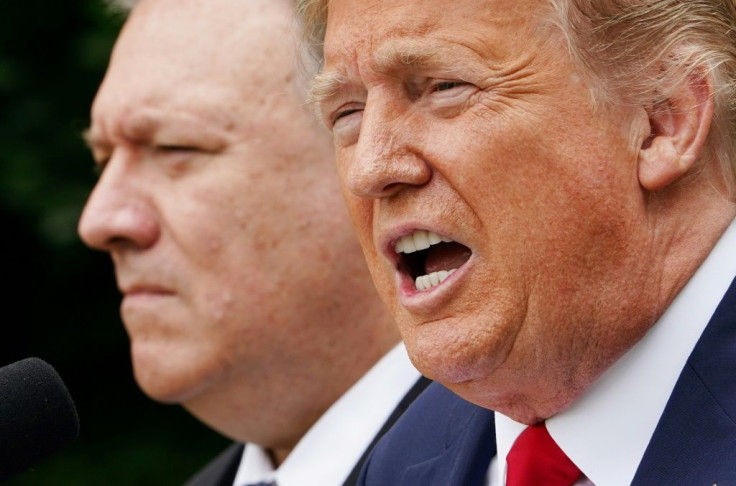Turbulent Trump Diplomacy Ends With Scrapped Europe, Taiwan Trips
The United States called off last-minute trips by top envoys to its allies in Europe and Taiwan on Tuesday in a sudden diplomatic volte-face during the chaotic swansong days of the Trump administration.
Secretary of State Mike Pompeo had been due to make a final official visit to Europe while Kelly Clark, Washington's UN envoy, was set to land in Taiwan on Wednesday afternoon.
But the visits were suddenly scrapped a week before Democrat Joe Biden takes office and as President Donald Trump faces an all-but-certain second impeachment on a charge of inciting his supporters to storm Congress last week.
The U-turn encapsulates the turbulent transition period that has enveloped Washington since Biden's November election victory.
But it also allows both Europe and Taiwan to dodge hosting what could have been potentially awkward delegations by an outgoing administration.
"It was very late in the game to be having a visit of this level," Maggie Lewis, an analyst at Seton Hall Law school who is based in Taiwan, told AFP.
"It's appropriate to be focusing on the incoming administration instead of the final days of the Trump administration."
The canceled trips round off four tumultuous years of foreign policy under Trump that tested Washington's traditional allies in both Europe and Asia.
The two-day stay in Europe would have been Pompeo's last foreign trip but the State Department announced he was staying to ensure a "smooth and orderly" transition.
The trip was already looking of limited diplomatic value with Pompeo not scheduled to meet any top EU officials in Brussels.
In Luxembourg, an official told AFP on condition of anonymity that one leg of Pompeo's trip was canceled after Foreign Minister Jean Asselborn called Trump a "criminal" in comments to RTL radio.
Asselborn described Trump as a "political pyromaniac who must be brought before a court" over last week's attack on the US Capitol by his supporters.
Pompeo has remained staunchly loyal to Trump despite resignations from a string of his cabinet colleagues and calls to force the president from office over the attack on the Capitol.

Craft's planned visit to Taiwan came at an acutely perilous time for the self-ruled democracy.
Authoritarian China regards Taiwan as its own territory and has vowed to seize it one day, if necessary by force.
Beijing's saber-rattling has reached new heights with Chinese jets making a record 380 incursions into Taiwan's defense zone last year to signal anger over Washington's burgeoning relationship with Taipei during the Trump years.
The stakes are high. A wrong move in the Taiwan Strait could spark conflict between two economic, nuclear-armed superpowers, something the Biden administration will need to grapple with.
The US switched diplomatic recognition to Beijing in 1979 but it remains Taipei's leading unofficial ally and is bound by Congress to sell the island weapons to defend itself.
As Trump feuded with China on a host of issues, from the coronavirus to trade and national security, Taipei became a way to poke Beijing in the eye.
During his tenure, Trump signed off on some $18 billion in big-ticket arms deals for Taiwan and ramped up the frequency of official visits, including sending a cabinet official last year, the highest-level delegation since 1979.
Then on Sunday, Secretary of State Mike Pompeo declared he was lifting "complex internal restrictions" limiting official contacts with Taiwan.
Beijing promptly warned Washington would "receive a resolute counterstrike from China" over the move and "pay a heavy price" if Craft visited.
Protecting Taiwan, one of Asia's most progressive democracies, from a Chinese invasion has become a rare bipartisan issue in Washington.
But Biden, who favors a far less confrontational diplomatic style that Trump, has given few details on what his Taiwan policy might be.
Bonnie Glaser, an expert on Taiwan and China at the Center for Strategic and International Studies, said Taipei would be "disappointed, but also somewhat relieved" by Craft's last-minute cancellation.
"Taiwan doesn't want to create friction with the incoming administration," she told AFP.
© Copyright AFP 2024. All rights reserved.




















